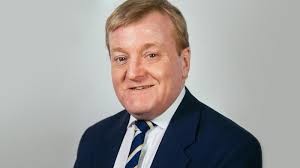Tributes paid to former Lib Dem leader Charles Kennedy
Published on 2 june 2015David Cameron said politics had lost a man of "immense ability", while Nick Clegg said his opposition to the Iraq war had been "enormously courageous".
Mr Kennedy, who led his party for over six years, took it to its best election result in 2005 but battled alcoholism.
No cause of death has been given but police said it was not suspicious.
Mr Kennedy, who lost his seat in last month's election, died at his home in Fort William on Monday. His family said they were devastated to lose a "fine man and loving father".
Under Mr Kennedy's leadership, the Lib Dems won a record 62 seats in 2005 but he resigned eight months after the election after revealing he had been receiving treatment for a long-standing drink problem.
'He left his mark on politics'
By Nick Robinson, BBC political editor
Charles Kennedy left a mark on British politics. The man who took his party to its electoral peak, he was the only UK party leader to warn the country of the perils of invading Iraq when Labour and the Conservatives were uniting to support it.
He was also the only Liberal Democrat MP who could not bring himself to vote to form a coalition with the Conservatives.
But British politics also left its mark on him. Elected at the age of just 23, politics and the House of Commons became his life whilst alcohol was his friend, his prop and his curse.
Mr Clegg, who will step down as Lib Dem leader next month, said that on a good day Mr Kennedy had "more political talent in his little finger than the rest of us put together".
"Charles devoted his life to public service, yet he had an unusual gift for speaking about politics with humour and humility which touched people well beyond the world of politics," he said.
"He was one of the most gentle and unflappable politicians I have ever known, yet he was immensely courageous too not least when he spoke for the country against the invasion of Iraq."
Mr Kennedy's family said in a statement: "It is with great sadness, and an enormous sense of shock, that we announce the death of Charles Kennedy.
"We are obviously devastated at the loss. Charles was a fine man, a talented politician, and a loving father to his young son."
A Police Scotland spokesman said: "Police officers attended an address at Fort William on Monday, June 1 to reports of the sudden death of a 55-year-old man. Police were notified by ambulance service personnel. There are no suspicious circumstances."
Mr Kennedy's political career began in the Social Democratic Party and he became the youngest MP of the time at the age of 23 when he won the Ross, Cromarty and Skye seat in 1983.
At first he was SDP spokesman on social security, Scotland and health and when most of his party merged with the Liberals to form the Lib Dems in 1988, he continued to hold a series of frontbench posts.
He took over the Liberal Democrat leadership from Paddy Ashdown in 1999.
'Chatshow Charlie'
During the 1990s, Mr Kennedy had built up his profile through a series of TV appearances, earning him the nickname, which he hated, of "Chatshow Charlie".
His 2002 marriage to Camelot public relations executive Sarah Gurling was seen by many in the party as a sign he was settling down.
The birth of his son in 2005 was seen as a further sign that the hard-partying Kennedy - one commentator had dubbed him "Jock the lad" - was being transformed into a family man, although he and his wife split up in 2010.
After his resignation, Mr Kennedy maintained a lower profile. He did not play any role in the coalition government, having voted against his party's decision to enter an alliance with the Conservatives.
Writing in May 2010, he said the tie-up with the Conservatives drove "a strategic coach and horses through the long-nurtured 'realignment of the centre-left' to which leaders in the Liberal tradition, this one included, have all subscribed" since the 1950s.
'We became chums'
By Brian Taylor, BBC political editor, Scotland
I remember in 1983 when he was first elected. He was 23 years old. It was a rather unexpected victory.
He had been on a scholarship in the US and returned, and after a couple of weeks campaigning found himself an MP after taking a Conservative seat in Ross and Cromarty.
I was in the Westminster lobby at the time as a slightly older lobby correspondent. We got together and became chums. I was working for the Press and Journal. He was a very senior MP for me to be covering.
He was a remarkable individual even then. Talented and driven, he always struck me though as being slightly remote from partisan politics. He never had that killer instinct. He could always see the other side of the perspective.
He was exceptionally gifted.
Source: BBC NEWS


